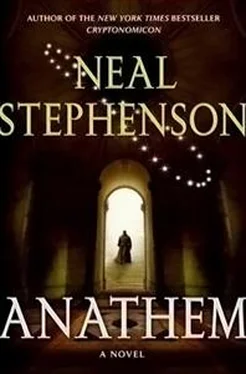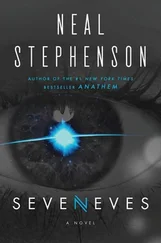Because of my work with Fraa Orolo, I knew that the Moshianic Iconography was ascendant, in the guise of the so-called Warden of Heaven. Our hierarchs had become aware of this, and the Warden Fendant had asked Grandsuur Tamura to lead us in this discussion.
In the end, she gave the whole crop permission to go extramuros during Apert, which surprised no one: the threat of locking us up had only been to make us pay heed.
The discussion had actually become quite interesting, and the only thing that ended it was the ringing of the curfew bell. It was part of our Discipline never to sleep two nights in a row in the same cell. Assignments were posted each evening on a slate in the refectory. We had to go back there to find out where we’d be sleeping and whom we’d be chumming with. So the entire group made its way out of the chalk hall and around the Cloister, chattering and laughing about Dox and Yorr and the other funny characters that the extras had dreamed up in an effort to make sense of us. Older fraas and suurs sat on the benches that faced into the Cloister, assembling sandals—normally our sort of job—and giving us dirty looks.
It was important that I not let any one of the sandal-makers catch my eye, so I looked elsewhere. I noticed Fraa Orolo emerging from one of the other chalk halls with a sheaf of leaves, cluttered with calculations, tucked under his arm. He started one way, then, seeing our crowd, turned into the garden instead, and headed off in the direction of the Mynster. This gave me a little twinge, for a certain tablet of Saunt Tancred’s Nebula was gathering dust on a table in a workroom up in the starhenge, holding down a couple of leaves stained with inconclusive notes and scratch-outs in my handwriting. Orolo would notice, and know I hadn’t worked on it in days.
A few minutes later I was in the cell that I was to share that night with two other fraas, wrapping myself up in my bolt and making my sphere a pillow. You might expect that, as I lay there trying to get to sleep, I’d be thinking about Apert or about the iconographies. But spying Fraa Orolo in the Cloister had put me in mind of the slippery sentence that Fraa Corlandin had spoken at dinner, and that I’d swallowed without tasting. Now it had become one of those unwelcome thoughts I didn’t know how to get rid of.
That’s what I heard, Fraa Corlandin had said. But my dialog with Orolo had taken place only an hour before dinner. Who among the spectators had run off to spread the story in the New Circle chapterhouse? Why did anyone care?
Until last year, Corlandin had been in a liaison with Suur Trestanas, also of the New Circle. Then one day the bells had rung to signal the aut of Regred, meaning that someone had made the decision to go into retirement. We had convened in the Mynster and the Primate had called out a name: that of our Warden Regulant. Despite all of the penance that this man had meted out to us over the years, we all felt sorrow as we sang the chants of the aut, for he’d been reasonable and wise.
Statho—the Primate—had then named Suur Trestanas the new Warden Regulant. It was a little bit of a surprise because she was young, but not controversial since everyone knew she was bright. She’d moved to the Primate’s Compound where she now had a cell to herself, and took her meals with the other hierarchs. But rumor had it that her liaison with Fraa Corlandin continued. Some avout, of a suspicious mindset, believed that the hierarchs had devices salted around the concent that enabled them to know what we were saying. Believing so was a fad that came and went depending on what people thought of the hierarchs at a given time. It had been on the rise since Suur Trestanas had been appointed Warden Regulant. It was impossible for me not to think of it now. Perhaps she had listened to my dialog with Orolo and then passed it on to Corlandin.
On the other hand (said the part of my mind that pleaded with such thoughts to go away), I had to admit that I myself had thought it strange that Orolo would suddenly take an interest in Old Orth translation errors.
Who could have guessed that our cosmographer was an enthusiast for dead languages? Well, enthusiast was one of those unkillable words that had passed almost unchanged from Proto-Orth all the way up into Fluccish. In Fluccish—which was how I assumed, at first, Corlandin had used it—it simply meant one who liked something. The Proto-Orth meaning, however, was not a very complimentary one to hang on a fraa, especially a theorician like Orolo. And dead languages too was an interesting choice of words. Was it really dead if Orolo was reading it? And if Orolo was right about the translations, then by calling the original “dead,” wasn’t Corlandin sort of making a point—and doing it in a sneaky way, without going to the effort of proving it?
After what seemed like hours of lying awake and worrying about this, I had the upsight that the things Fraa Orolo said—even when they caused me embarrassment or outright pain—never made me wrestle with my bolt in the night-time in the way that these words from Fraa Corlandin had. This made me think I’d rather join the Edharians.
If, that is, the Edharians would have me. I was not so confident that they would. I’d never been as quick to grasp pure theorics as some of the other fids. This must have been noticed. I wondered: why had Grandsuur Tamura asked me the first, and easiest, question? Was it because she didn’t think I could handle anything more difficult? Why did Orolo have me working as an amanuensis instead of doing theorics? Why was Corlandin now trying to recruit me? Putting it all together, I came to the conclusion that everyone knew I just wasn’t fit to join the Edharian order, and some were trying to prepare a soft landing for me.
Ita:(1) In late Praxic Orth, an acronym (therefore, in ancient texts sometimes written ITA) whose precise etymology is a casualty of the loss of shoddily preserved information that will forever enshroud the time of the Harbingers and the Terrible Events. Almost all scholars agree that the first two letters come from the words Information Technology, which is late Praxic Age commercial bulshytt for syntactic devices. The third letter is disputed; hypotheses include Authority, Associate, Arm, Archive, Aggregator, Amalgamated, Analyst, Agency, and Assistant. Each of these, of course, suggests a different picture of what role the Ita might have performed in the years before the Reconstitution, and so each tends to be advocated by a different suvin. (2) In early New Orth (up to the Second Sack), a faculty of a concent devoted to the praxis of syntactic devices. (3) In later New Orth, a proscribed artisanal caste tolerated in the thirty-seven concents that were built around the Great Clocks, all of which are in technical violation of the Second Sack reforms in that their clocks were built with subsystems that employ syntactic devices; the task of the Ita is to operate and maintain those subsystems while observing strict segregation from the avout.
— THE DICTIONARY, 4th edition, A.R. 3000
The last night of 3689 I dreamed that something was troubling Fraa Orolo, and that everyone had noticed, but on no account would he or anyone else speak of it openly. So it was a mystery. And yet everyone knew what it was: the planets were deviating from their courses, and the clock was wrong. For part of the clock was an orrery: a mechanical model of the solar system that displayed the current positions of the planets and many of their moons. It was in the narthex or lobby between the Day Gate and the north nave. It had been exactly correct for thirty-four centuries, but now it had gone out of whack. The marble, crystal, steel, and lapis spheres that represented the planets had moved to positions that were at odds with what Fraa Orolo could plainly see even in the smallest of telescopes. Never mentioned in the dream, but understood by me, was that the problem must have something to do with the Ita, because the orrery was one of the systems driven by the devices that they tended in the vaulted cavern beneath the floor of the Mynster.
Читать дальше





